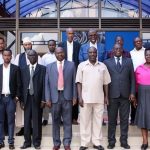Background
RPLRP project funded by the World Bank is being implemented in Kenya, Ethiopia and Uganda has the objective of enhancing livelihood resilience of pastoral and agro-pastoral communities in cross-border drought prone areas so as to improve their capacity to respond promptly and effectively to any eligible crisis or emergency (drought, floods etc). The project seeks to address a set of regional public goods that would address challenges and build on opportunities created by the changing pastoral environment. It further coordinates investments in shared natural resources and in sub-regional infrastructure networks, exchange knowledge and information, coordinate monitoring and responses to shocks, manage cross-border conflicts over limited resources, and ultimately harmonize policies under IGAD coordination to promote cross-border and intra-regional livestock trade.
The two days workshop reviewed two consultancy reports; 1) cross-border livestock trade policy which mapped cross-border livestock market infrastructure; and assessed existing livestock market information systems of Kenya, Uganda and Ethiopia; and, 2) An assessment report on demand and supply of financial service/products in pastoral areas. Other discussion points included Minimum Integration Programme (MIP) in the IGAD region, an overview of cross-border livestock markets and livestock market information system in the IGAD region. The workshop sought to broaden the existing cross-border livestock markets and prevailing gaps in the marketing system and infrastructure facilities in the three countries to inform decision making and further investment that can enhance cross-border trade targeting possible major livestock trade catchments across the borders of the three countries.
Recommendations
- IGAD to facilitate the harmonization of the cross-border regulatory frameworks and policies to enhance production, trade and information sharing.
- MS and IGAD to facilitate integration of pastoralism with intensive livestock production methods such as feedlots, ranches, fodder production, as well as devising strategies that will attract private sector investment.
- MS/Regional or sub-county governments should support infrastructure development or rehabilitation (markets, road, water, etc.) to regularize informal and improve efficiency respectively of cross-border trade.
- MS with support of IGAD should explore modalities of harmonizing and cascading the weather-based livestock insurance system initiated in Kenya and Ethiopia to other MS in order to cushion pastoralists against consequences of frequent drought in the region.
- IGAD and MS should promote cross-border information sharing on resource management and trade.
- IGAD and MS should actualize and promote trans-boundary animal disease management (surveillance, diagnostics, vaccination, treatment) and animal genetic resource conservation/utilization.
- MS should provide designs and standards of livestock transport trucks & other infrastructure. IGAD to support harmonization across MS.





